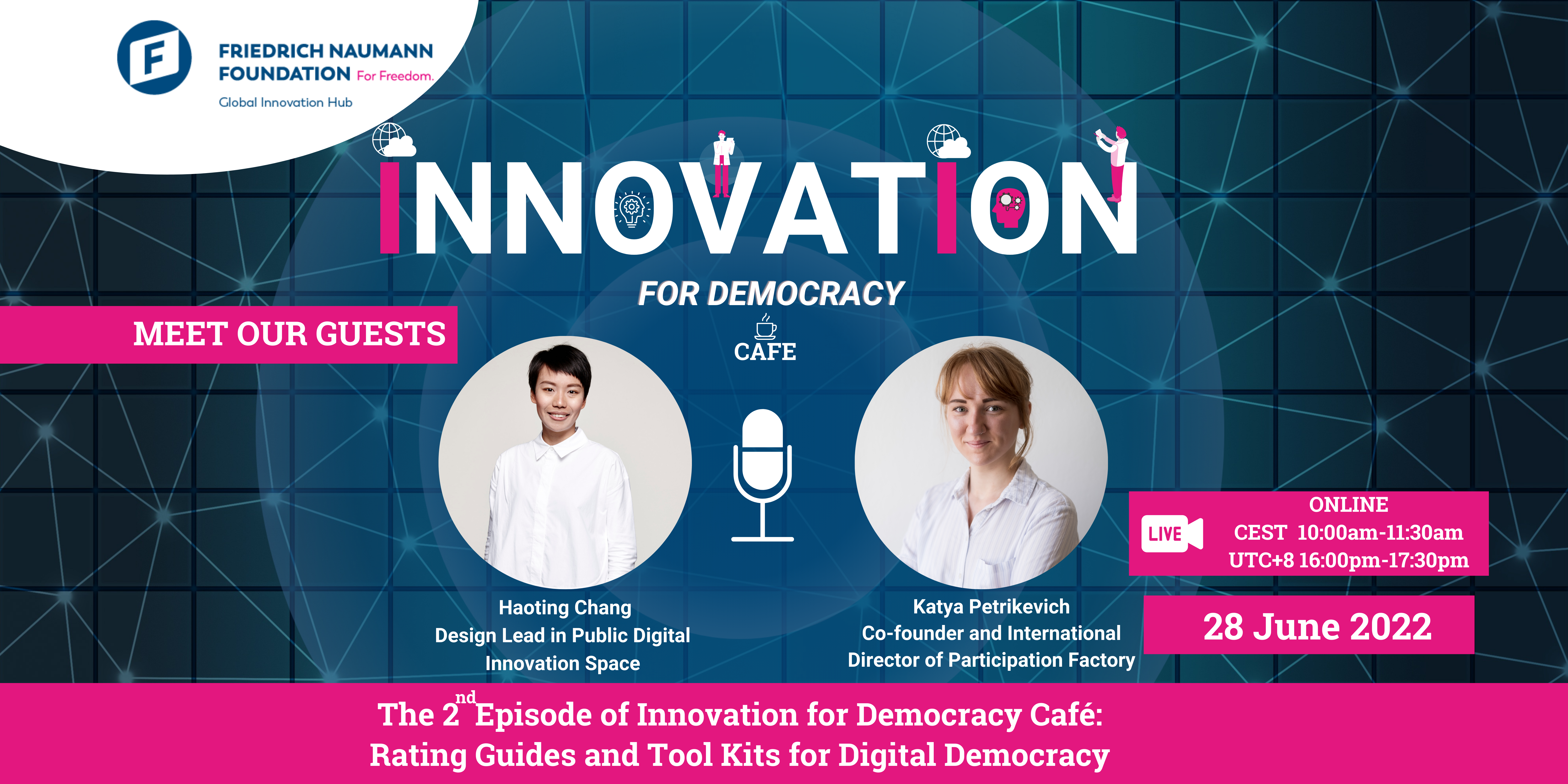Innovation for Democracy Café
Register for the 2nd Episode-Rating Guides and Tool Kits for Digital Democracy

Join the 2nd episode of Innovation for Democracy Cafe on June 28th, 2022, 10:00-11:30am CEST. Register for the Cafe by clicking here!
What is Innovation for Democracy Cafe?
In 2022, we are launching the “Innovation for Democracy Café“! In a series of digital events, we will showcase best practices of civil society: how to make use of digital technology or innovative approaches to foster freedom, democracy, and human rights. Innovation for Democracy Café will be hosted by Ya-wei Chou, FNF Global Innovation Hub’s Program Manager for the the topic of Innovation for Democracy. Please visit here if you would like to see the previous episode.
The Second Episode:Rating Guides and Tool Kits for Digital Democracy
In this episode, we want to talk about digital democracy. There might be a hundred definitions on what digital democracy is, but the general ideal is to make public participation possible through digital approaches. The spread of COVID-19 has accentuated its importance: when physical communication is impossible, the government and the people have to rely on digital tools to sustain the operation of a quality democracy. During the time without COVID, digital democracy provides more convenient and workable approaches of participation.
However, in order for people to play an active role in digital democracy, we further discover that citizens and advocates also need more resources or knowledge:
Some of it might sound very technical, which then might deter people. For example, how to check if privacy protection of a digital tool is sufficient, but that knowledge is not necessarily accessible for everyone. Also, to enhance the transparency of digital tools, people should know why open source matters, and open-sourced tools should be offered as an option.
People need to know what digital tools they can use, how to use these digital tools, and they need to know how to rate them. Only then, they can lead the progress of digital democracy, making digital democracy a bottom-up one. Especially for practitioners initiating a discussion in a community, ratings of these tools based on costs, usability, and privacy protection will be crucial. With these knowledge, people can not only operate digital tools in their communities, but also recommend those to the government. Particularly, civil servants will also need to learn how to help the government cope with problems caused by its fixed structure and public procurement rules when adopting digital tools.
People should also have sufficient knowledge in order to evaluate whether they should adopt digital tools. For example, when a digital tool is not accessible to most people due to the digital divide, alternatives, including non-digital ones, should be provided.
Last but not least, to make digital democracy workable in the government, adjusting administrative structure and cultivating the culture that supports digital democracy are also important. These efforts may not be physically detected, but they are key elements of creating the environment to support the operation of digital democracy.
In this episode, we invited Ms Katya Petrikevich, Co-founder and International Director of Participation Factory, and Ms Hao-ting Chang, Design Lead in Public Digital Innovation Space, to discuss those topics with us. Ms Katya Petrikevich contributes tremendously to establish the People Powered’s Guide to Digital Participation Platforms and Platform Ratings. Ms Hao-ting Chang has accompanied and trained many government apparatuses to learn how to make use of digital tools to enhance people’s participation, and how to redesign their policy making structures and culture. Their presentation will help the audience develop a good command on digital tools, and use them to innovate more inclusive and resilient ways of public participation.
Meet our guests here:
Haoting Chang, Design Lead in Public Digital Innovation Space

Haoting is the Design Lead in Public Digital Innovation Space in central government in Taiwan. She is experienced in formulating design decisions for solving complex problems by using user-centered design thinking and research skills. Her works focus on Participatory Design, Civic Participation in Open Government, and Youth Participation. She believes through the participation, people will understand each other’s experiences and difficulties, and thereby form a bottom up policy forming process that provides opportunities for everyone to give ideas and get involved in the public services making process. The expectation that public services are “supplied by the government to the people” will be shifted to that “services can be created by the people and the government together,” thus forming an inclusive public service.
Katya Petrikevich, Co-founder and International Director of Participation Factory

Katya leads international activities of Participation Factory and works on mainstreaming the best practices in the field of public participation and CivicTech. She is also currently serving as a member of a Participatory Budgeting (PB) practitioners board of People Powered. As a part of its network, she provides mentoring to implementers of PB around the world and has also been a part of the Civic Tech Review Committee. In the course of her work, Katya coordinated work of domestic and international offices of a civic tech and advisory company and provided expertise for the development of new methodologies. As a part of her work, she also supported research on current trends in tech for the EU Commission, trained young Western African leaders at the TechCamp in Abidjan, and served as a jury member of the Prague Civil Society competition SWITCH. Katya always tries to bring her knowledge of human rights into the field of participation and civic engagement with special attention paid to the issues of gender parity and inclusion of marginalized groups.
Should you want to register for this event, please click here
You can download the program here.